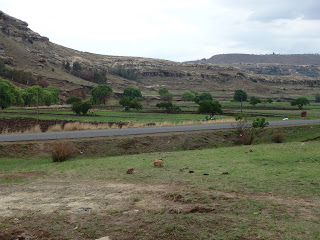This time last year, I was learning just how much
my roof could leak.
 |
My wet path through the
donga last October, |
This time last year, I was learning to tread
carefully through the incredibly slippery mud to avoid skating across it.
This time last year, the village’s fields had been
planting and the maize was already over a foot high.
This time last year, when I walked through the donga,
I had to follow the path as a stream ran through the center of it. I had to
rinse the mud off my feet at one of the many pools to avoid reaching town with
mud-encrusted feet.
This time last year, I did my laundry at home,
using the water my family collects from the roof.
 |
| The view from my house one afternoon last October. |
This time last year, rainbows and afternoon
thunderstorms were the norm.
This time last year, I used my umbrella daily to
hide from the hot sun in the mornings and the drenching downpours in the
afternoons.
Today,
my roof has been repaired. I learned in
September when we had rain, that it still leaks, however, it is not leaking
right now.
Today, I find myself trudging through the dry and
dusty sand instead of skating slipping through the mud.
Today, the fields are sitting, ready for maize
that has not been planted yet.
 |
| My incredibly dry walk through the donga this morning. |
Today, the donga is dry. All but one pool has
dried up completely. That pool is muddy, algae-filled, and holds very little
water right now.
Today, I continue my dry season routine, going to
the spring to do my laundry as I pray that the slowing flow rate does not
become a dry spring.
Today, I carry my umbrella, hoping to use it, however,
it is usually too windy.
A few weeks ago, the Lesotho Disaster Management
Authority sent out a text message to the country. It read, “Dry conditions are
predicted country-wide from now up to March 2016. The public is advised to be
cautious and prepare for the expected impacts.” Sometimes the media is
attributing the drought to climate change, other times to El Nino. Regardless, it is here and it is definitely
an issue.
Instead of rainy afternoons and evenings, Lesotho
is reminiscent of the dust storms scenes in Interstellar.
Twice in the last two months, we have had damaging dust storms pass through,
blowing dust through walls, windows, and roofs, ripping roofs right off of
homes, and bending the sign metal like it were silly putty. Most afternoons,
the wind picks up, blowing thunderclouds through without giving them a chance
to even sprinkle upon us. The few rains we have seen last only long enough to
pockmark the sandy ground, not long enough to moisten it fully.
While my American friends are filling my Facebook
newsfeed with opinions about terrorism, refugees, and the political primaries,
my fellow PCVs are posting stories connected to a life without water. My
friends in the southern districts of Mafeteng and Mohale’s Hoek share anecdotes
about not being able to do laundry, waiting in line for hours at the only
working water pump, Peace Corps delivering water, and the like.
I am blessed to live in the northern part of
Lesotho, which is typically wetter than those districts. As a result, we have
not fully exhausted our water supply, however, the water shortage is already
creating an impact. For the last month, the water for town has been turned off
most of the time. This has made it particularly exciting when looking for a
toilet while in town, where latrines are scarce.
 |
| The empty fields ready for planting. |
I spoke with my chief recently about how well our
village is prepared to deal with the repercussions of this drought. My initial concern was whether he anticipated
we would run out of water. He was quick to point out that the water flow has
decreased already, however, not to a point where we need to start rationing.
Our next step would be to turn off the taps, opening them for a specific number
of hours each day and limiting each family to one or two buckets of
water-20L to 40L.
Our conversation naturally turned to the part that
is of greater concern, the staple crops. The maize, sorghum, and beans have not
been planted yet because of the lack of rain. If it does not rain until March,
what does that mean for food over the coming year? Will the maize have time to
produce before winter? Will the people in the community who buy very little of
their food be able to survive on what is grown this year?
It is too soon to answer the questions, but they
plague me regularly as I watch the clouds dance their way across the mountains
every afternoon. They concern me as I walk through the village and see the
empty home gardens, waiting for the rain. They terrify me when I walk by the
village’s tilled maize fields and the agriculture building with the bags of
seeds stacked against it.
 |
| The field areas last year on a misty day. |
The worst thing about living in a developing
nation is that it is ill equipped to correct for this drought. Lesotho has
water, lots of water. It is dammed up behind places like the Katse Dam and the
Mohale Dam. Lesotho exports water to South Africa every day. It does not,
however, have the infrastructure to get this water to its own people.
Toto famously sang, “Bless the rains down in
Africa.” Today, we beg to be blessed with those rains!









































